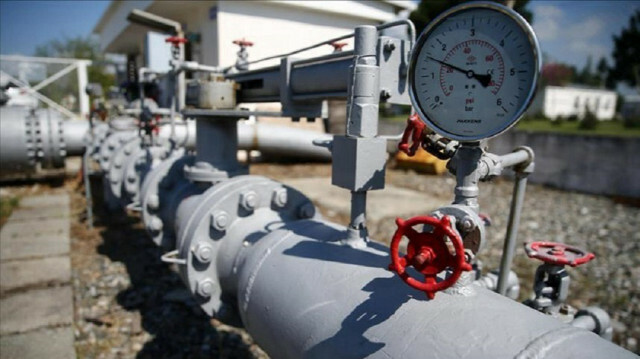
Warsaw is capable of importing all its needs through LNG terminal and from its neighbors, says expert
Poland is ready to fully cease Russian gas supplies as it has alternative energy sources, an energy analyst from the Jagiellonian Institute in Poland, Wojciech Jakobik, said Thursday.
Jakobik, who is also the editor of Biznesalert, a prized source on key energy and infrastructure issues in Poland told Anadolu Agency that Bulgaria can also do without Russian gas with EU support as echoed by the European Commission.
"This is something the European Commission has been preparing for, in close coordination and solidarity with Member States and international partners," European Commission President Ursula von der Leyen said on Wednesday.
"This shows first of all the immense solidarity among us but it also shows the effectiveness of past investments, for example in interconnectors and other gas infrastructure. The Commission will also intensify its work with the so-called regional groups of Member States, that can provide the most immediate solidarity to each other. This will mitigate any impacts on possible gas disruptions," he noted.
He further confirmed that work would continue to ensure sufficient gas supply and storage in the medium term.
"Our action plan REPowerEU will help to significantly reduce our dependency on Russian fossil fuels already this year," he said.
Jakobik explained that Poland is capable of replacing half of its import needs from Russia through other sources.
"Poland uses 20 billion cubic meters per year and had imported up to 10 billion cubic meters. It is capable of importing all its needs through LNG terminals and from its neighbors. Soon it will be ready to import more through the Baltic Pipe from Norway and LNG from Lithuania," he noted.
Nonetheless, Jakobik envisages that there could be gas usage limitations in Europe in the autumn to guarantee security of supply. He recommended that the EU continue to work to secure supplies in the likelihood of a total gas cut-off from Russia.
-‘Gazprom prohibited from supplying unless gas payments made in rubles’
Katja Yafimava, a senior research fellow at the Oxford Institute for Energy Studies Natural Gas Research Program said supplies to Poland and Bulgaria had been suspended because of their refusal to follow the new payment mechanism established under a Russian presidential decree.
She said the new procedure still allows European buyers to pay in euros, but the decree has mandated additional steps to be made by Russia’s third largest bank, Gazprombank, for the payment to be considered complete; namely the conversion of euros into rubles and their subsequent transfer to Gazprom’s account.
However, she explained that Poland and Bulgaria have said this procedure is in contradiction to their existing supply contracts and listed this alleged contradiction as the reason for rejecting it.
She argued that under the decree, Russian energy giant Gazprom is prohibited from supplying gas unless payment is made in line with the new procedure and had no choice but to suspend supplies.
"At the same time, it has been reported in the media that four European buyers have already made payment in rubles and ten buyers have opened ruble accounts in Gazprombank as required by the decree - which suggests that these buyers do not necessarily see the new payment procedure being contradictory to their supply contracts and may accept it, provided they are given assurances that doing so does not violate the EU sanctions regime," she explained.
Gazprom announced Wednesday that it suspended gas deliveries to Bulgaria and Poland due to their refusal to pay in rubles.
Poland, with its reliance on Russia for half of its natural gas imports of 10 billion cubic meters (bcm) per annum, had already decided not to renew its contract with Gazprom, which expires at the end of the year.
Poland is planning to replace Russian gas with Norwegian gas that is set to start flows through the Baltic pipeline on Oct. 1, in addition to a bi-directional pipeline connecting Lithuania that will start operations on May 1.
Bulgaria is 100% dependent on Russian piped gas imports, and similar to Poland will end its contract with Russia at the end of the year.
With the aim of diversifying its energy imports to avoid relying solely on Russian imports, the country struck a deal to purchase gas from Azerbaijan.
Hello, the comments you share on our site are a valuable resource for other users. Please respect other users and different opinions. Do not use rude, offensive, derogatory, or discriminatory language.
The floor is all yours.








